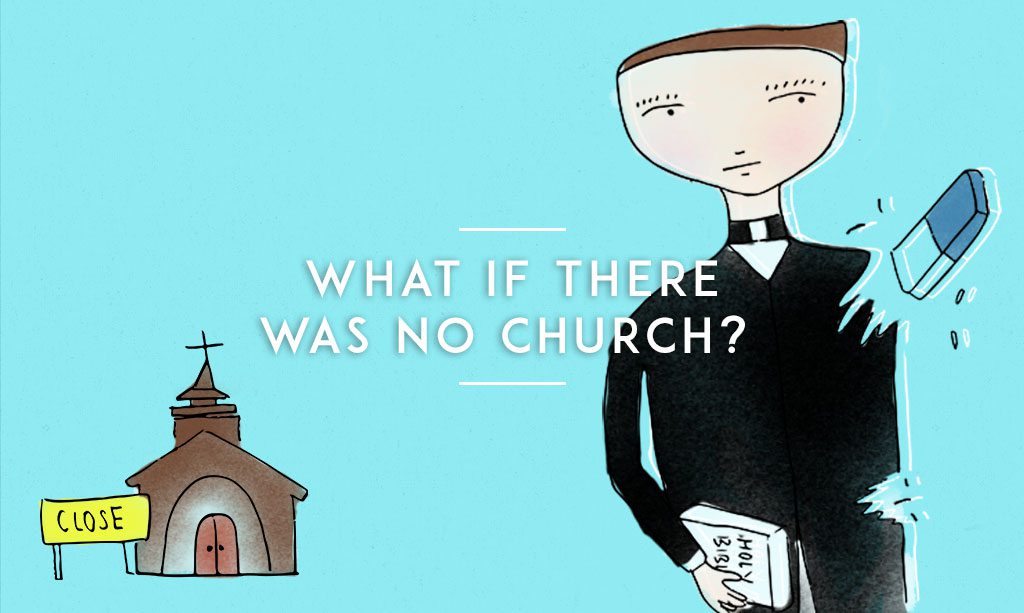What if There was No Church?

Written By Leslie Koh
After spending a number of years in the media, Leslie finally decided to move from working with bad news to good news. He believes in the power of words (especially when they’re funny). He works as an editor in Our Daily Bread Ministries.
It’s probably hard to imagine not having a church around, at least in some form.
It could be a building—a grand old cathedral, a modern theatre, a space in an office block, or someone’s house, generously opened up for use on Sundays. Or it could be some sort of system—an official or unofficial organization with a pastor or group of elders leading a body of believers—that organizes regular services or meetings. (Or any entity that comes to mind when we say things like, “I go to church on Sundays”, or “My church teaches that . . . ”, or “I’ll ask my church to help me”.)
But what if the building we called church were to be torn down by the authorities or destroyed by nature? What if there were no more “church” organizations, because they were banned or no one wanted to form and lead them? What if there were no more leaders to organized regular services or no preachers who wanted to teach? What would you do?
You could consider two options:
1. Stay at home and practise your faith on your own. Yes, you could still study the Bible on your own and pray with your family.
2. Find ways to meet up with fellow Christians somewhere, somehow, because you feel that you still need to . . .

…To pray and worship together
Long before the New Testament church came into existence, God’s people were gathering to worship Him. When the Israelites offered their sacrifices and offerings, they did it as a corporate body at the Tent of Meeting. They gathered to listen to God’s Word, spoken through Moses. And they gathered to praise God as one body.
In his article, “Why We Shouldn’t Neglect to Meet Together”, co-founder of Desiring God and author Jon Bloom takes us even further back and notes how the nature of God himself—not just one, but Three in One—reflects the importance of corporate worship. The Trinity also created a companion for Adam. Why, Bloom points out, would Adam need a companion when God’s companionship would have been more than adequate for any man? “Adam’s being alone wasn’t good for God,” he writes. “The ultimate point was not that all of God wasn’t enough for all of Adam. It was that all of Adam wasn’t enough for all of God. One human would not enjoy God as much as many humans together.”
That is why Hebrews 10:25 reminds God’s followers not to forsake “our own assembling together, as is the habit of some, but encouraging one another; and all the more as you see the day drawing near”. God wants us to worship Him both as individuals and as a community. Why? Because “we, who are many, are one body in Christ, and individually members one of another” (Romans 12:5). This description of Christ’s followers would be meaningless if we were to worship God as individuals.
Just think of what it’s like to watch a big football game. You could watch it alone on TV, in the privacy and comfort of your own home. But nothing beats gathering in a stadium with 20,000 other fans and celebrating each goal with big cheers, high-fives and fist bumps, right? Because nothing unites us more than a shared love, joy, and victory. What more when we want to celebrate God’s greatness and Jesus’ victory over death?

…To study the Word together
Imagine trying to study the Bible on your own. You could read as many commentaries and Bible study guides as you can, but you’ll soon find yourself asking for help to understand God’s Word better, and for guidance on how to apply it in your life. Why? Because the Bible is not a textbook or Wikipedia site that you can simply read and expect to understand fully just by doing so. Neither is it a story book that you can enjoy and appreciate by yourself. It is the living Word of God, and needs to be interpreted wisely so that you can apply God’s wisdom in your daily life.
This means we need to learn from others who are more knowledgeable and mature in the faith, as well as discuss with fellow believers, so that we can share our experiences and discoveries with each other. In Jesus’ time, God’s people met in the synagogues to hear His Word and learn from teachers. In schools, we attend lectures where teachers and other experts explain new concepts to us, and have group discussions in tutorials, which help us understand and apply what we learn. Why should we do any different with the Word of God?
The apostle Paul, a learned Pharisee himself, stressed the importance of teaching and learning from one another: “Let the message of Christ dwell among you richly as you teach and admonish one another with all wisdom through psalms, hymns, and songs from the Spirit, singing to God with gratitude in your hearts” (Colossians 3:16).

…To support, encourage, and build up one another
The Christian journey includes trials, tribulations, and challenges, which makes it a hard one to walk alone. Yes, Jesus Himself walks alongside us and carries us, but God also gives us human companions so that we can encourage, inspire, comfort, and strengthen one another. There are times when we need that fellow human voice, comforting hug, or listening ear, to help us through the hardest times and remind us that we are not alone. And there are also times when we need someone to chasten or remind us to push past our complacency and persevere in our journey of faith.
Romans 12:5 tells us we are one body in Christ. One part of a body cannot strengthen the whole by itself; you can’t get a fit body by just doing pull-ups. All the different parts of the body need to work together and support each other so that “from [Christ] the whole body, joined and held together by every supporting ligament, grows and builds itself up in love, as each part does its work” (Ephesians 4:16). While we are all to grow a personal relationship with God, it is not an individual task.

…To gather for fellowship
Unless you’re a hermit or rabidly anti-social, you will need the companionship of friends. Not just for the bad times, but for the good times too. What beats a good laugh with friends, an enjoyable outing, or a hearty dinner with a few good buddies? Most of us have gone out with our colleagues for a nice meal after a long day at work, or a movie with classmates after school. We do it because we are brought together by a common experience in office or class; what more when we share a common belief, values, and mission?
…To welcome new believers into the body of Christ
Acts 2:47 describes how God was giving the early church new converts as they met daily, “adding to their number day by day those who were being saved”.
If fellow Christians stopped gathering together, where would a new believer go? Whom would he seek for advice and guidance, and who would teach him and help him grow in this new relationship with Jesus? A gathering of some kind would welcome this new believer, introducing him to the rest of the body of Christ and showing him that he was really joining a corporate body of members who believed in the same God and who would give him encouragement and strength for the days ahead. Such a gathering would remind him that his new relationship with God was both personal and corporate, while also giving him the assurance that he would not walk alone in his new spiritual journey.
What if there were to be no more “church” in the sense that there were to be no more buildings, system or organization known as a church? The short answer is, fellow Christians would still be meeting.
We might do it in small or large groups. We might meet regularly or occasionally. We might meet at someone’s home, in a public place, or somewhere convenient. We might do different things, but chances are, it will include worshipping God, studying the Bible, and praying together; sharing our experiences and discoveries; encouraging and strengthening one another; and having some fun. Just like what we do now . . . because that’s what a “church” is really about.
Church: In Greek, ekkelsia; an assembly of Christians gathered for worship.










Leave a Reply
Want to join the discussion?Feel free to contribute!